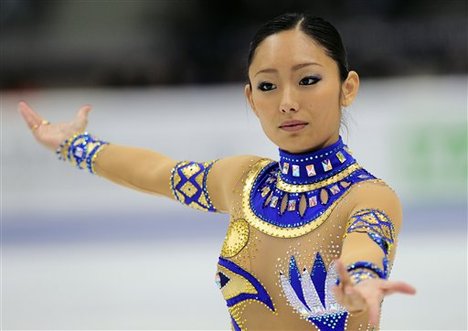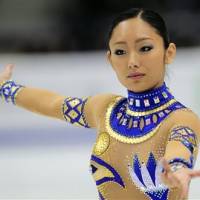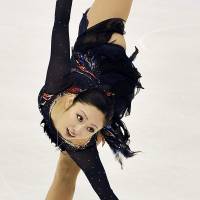"Do you believe in miracles?"
That is what American announcer Al Michaels cried in the final seconds of the upset victory by the U.S. men's hockey team against Russia in their semifinal game at the 1980 Lake Placid Olympics.
"Yes!" came the reply to his own question.
Well, in this case, my answer would be "No."
The question?
Will Miki Ando make Japan's team for the upcoming Sochi Olympics?
This weekend's Japan nationals at Saitama Super Arena will be Ando's final opportunity in her longshot bid to earn a berth on the team for the 2014 Winter Games. It may well take a miracle for her gain a spot on Japan's squad.
Analysis by Ice Time has yielded the conclusion that the only way Ando gets a ticket to Sochi is if she wins the nationals outright.
Selection for the Japan team is based on several factors:
■ Results at the nationals (the winner qualifies automatically)
■ Results at the Grand Prix Final
■ World rankings
■ Scores during the GP season
Under normal circumstances, it might be possible for the two-time world champion to pull it off. But after not competing for more than two years, and then giving birth in April to a daughter, Ando got a late start on her attempt to make the Olympics for a third time.
Having not competed in the Grand Prix season or world championships for two years, Ando's world ranking has now plummeted to 94th.
The nationals are more likely to represent a final farewell for Ando, rather than a stirring comeback. The Nagoya native, who turned 26 on Wednesday, has qualified for the nationals via regional competitions in Japan.
She has also skated in lower-level events overseas in Germany, Austria and Croatia. Her results have been mediocre and nowhere near her top form of years past, again highlighting the difficulty she will have in trying to win the nationals.
With a source having already told Ice Time that the Japan Skating Federation doesn't want Ando on the team, she will be trying to buck the establishment one final time.
The reality is that despite credentials which include two senior world titles (2007, 2011), three national championships (2003, 2004, 2010) a world junior crown (2004), two Junior Grand Prix Final victories (2001, 2003) and being the only woman to land a quadruple jump in competition (at the 2002 JGP Final), Ando's popularity with the Japanese public has never equalled that of younger rival Mao Asada.
Even though Ando came on the scene first, she has been skating in Mao's shadow since the latter's victory at the 2005 GP Final in Tokyo. Ando edged Mao for the world title in 2007 in Tokyo, but still could not resonate with fans and sponsors like Mao.
In the eyes of many, Mao is seen as a wholesome and angelic figure who represents the very best Japan has to offer.
Ando, on the other hand, is regarded more as a rebel. Regardless of the label, Japanese skating does owe a lot to Ando, who has helped raise its profile on the world scene.
I admire Ando for moving overseas, learning how to speak English, and taking the more difficult path. Her collaboration with coach Nikolai Morozov was very successful.
Unfortunately for Ando, she twice peaked in the year immediately after the Olympics, which does not remain long in the memory of most. Her 2010-11 season was absolutely fantastic, and culminated in her second senior world title.
As she tries for her third Olympic team, Ando is not only up against her fellow competitors, but also the conservative culture of the JSF. While she was winning, they tolerated her personal relationship with her coach. But that was then.
Now she is nearing the end of the line, and after not competing for a long period of time, and having a baby out of wedlock, she has really put herself in a difficult position. Image is still very important in Japan.
The JSF is no doubt looking to the future, and it is doubtful that Ando is in that picture. With a young child to look after now, it is almost certain that this will be Ando's final competitive appearance at the nationals.
Can she buck the system one final time?
It seems highly unlikely, but life is about drama and this will certainly be an interesting one to watch unfold.
Ice Time's predictions for the 2014 Japan Olympic team:
Women
■ Mao Asada
■ Akiko Suzuki
■ Kanako Murakami
Men
■ Yuzuru Hanyu
■ Daisuke Takahashi
■ Tatsuki Machida
Tuning up: Defending world and Olympic champion Kim Yu-na returned to competition with a victory in the lower-level Golden Spin in Zagreb earlier this month, where Ando placed second.
Though she nearly fell in her short program and did hit the ice on a double axel in the free skate, Kim's score still topped that of Mao's at the GP Final in Fukuoka.
Will that make a difference in Sochi?
Probably not, but it still shows how highly the judges rate her even after not competing at all last season.
It seems the biggest complaint anybody had was that from some of her fans, who did not like the yellow outfit she wore during the short program.
I will bet she is in a different color in the short program at the Olympics.
Star search: The results of Bing's annual survey of the most-searched athletes were recently revealed, and once again illustrated the ongoing popularity of skating in Japan.
Mao was the most-searched Japanese athlete in 2013, ahead of former snowboarder Melo Imai, who took second place. Ando came in fifth, while Daisuke Takahashi was eighth.
Interesting to note that Mao and Ando both finished well ahead of baseball superstar Ichiro Suzuki, who was seventh, and Takahashi ranked higher than soccer's Keisuke Honda, who placed 10th.



















With your current subscription plan you can comment on stories. However, before writing your first comment, please create a display name in the Profile section of your subscriber account page.